
Comprehensive Guide to Data Audit for Amazon Aurora: Security, Compliance, and Best Practices

Introduction
In this article, we’ll explore the essentials of data audit for Amazon Aurora, focusing on third-party audit solutions, setting up DataSunrise for auditing, and testing queries with Python.
Amazon Aurora, a popular relational database engine, powers countless applications. Data auditing is a crucial practice for maintaining database security, tracking user behavior, and ensuring compliance.
Native Data Audit for Amazon Aurora
Native Amazon Aurora database activity monitoring (DAM) and audit capabilities and their limitations include:
Database Logs
Aurora can generate various logs like error logs, slow query logs, and general logs.
Limitation: These logs can be verbose and may impact performance if enabled extensively.
AWS CloudTrail
Logs API calls and management events for Aurora. For real time user activity – see Database Activity Streams.
Limitation: Focuses on management actions, not detailed query-level auditing.
Performance Insights
Provides performance monitoring and query analysis.
Limitation: More focused on performance metrics than comprehensive auditing.
Aurora Advanced Auditing
Allows selective auditing of database events.
Limitation: May not capture full query details or results. Doesn’t capture query results.
Consider third-party audit solutions
- Tools like DataSunrise offer more extensive auditing capabilities.
- Can capture queries, results, and parameters without application changes.
- Provides more flexible filtering and storage options.
For a thorough audit, it is best to use a combination of Aurora’s built-in tools and a third-party solution.
Creating a DataSunrise Instance for Aurora Auditing
Creating an instance in DataSunrise is a simple process. Navigate to Configuration > Databases and complete the form using the appropriate credentials obtained from the Aurora Console in AWS.
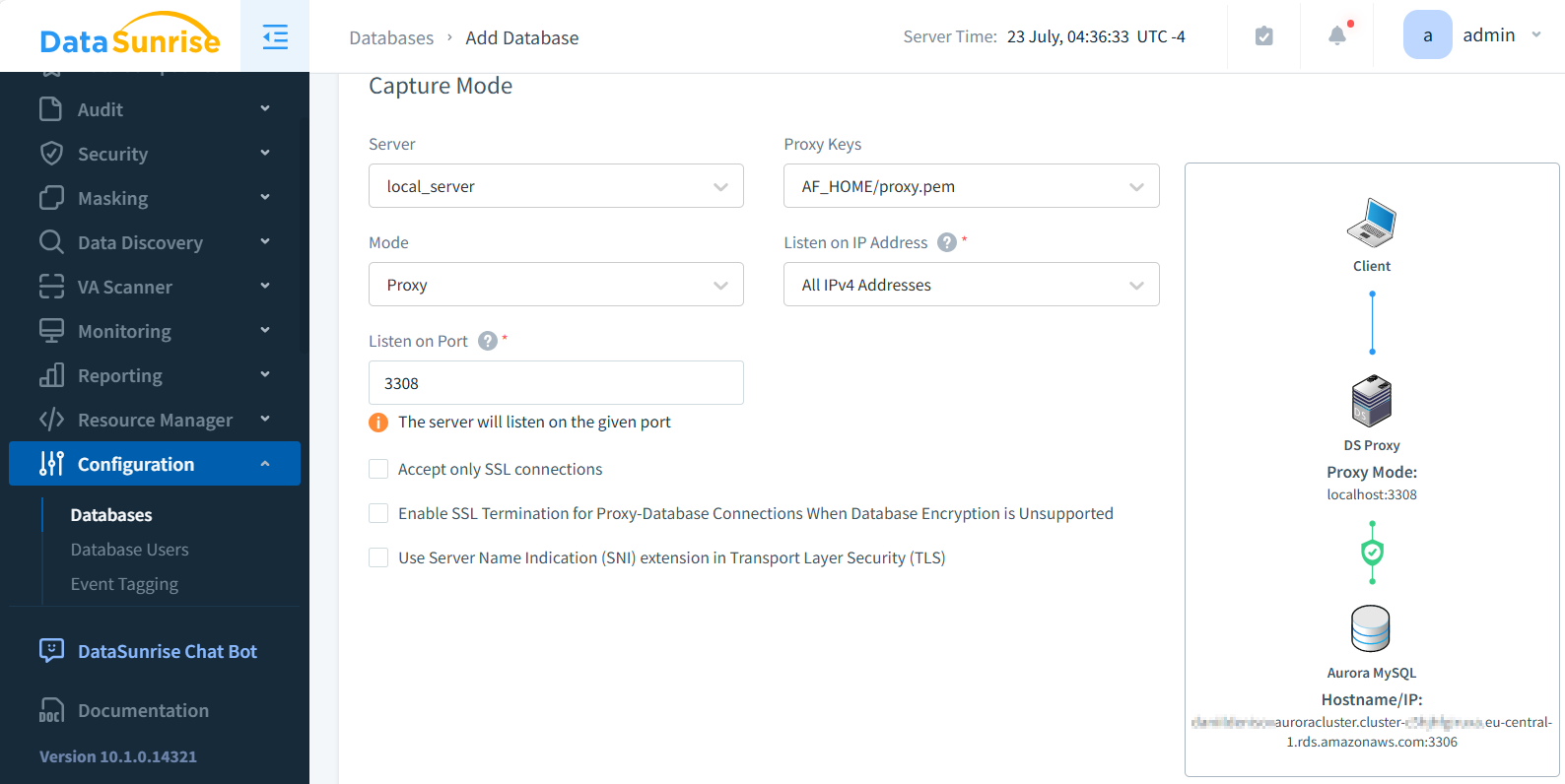
Make sure you note the proxy port number; it may differ from the default MySQL port.
Creating an Audit Rule in DataSunrise
Access the Audit Rules Section
- Log in to the DataSunrise dashboard.
- Navigate to the “Audit Rules” section.
- Click “Create New Rule”.
Define Rule Parameters
- Select your Aurora database as the target instance and select database objects.
- Choose the audit events you want to monitor (e.g., SELECT, INSERT, UPDATE, DELETE).
- Specify any conditions or filters for the rule.
- Set up alerts and notifications if desired.
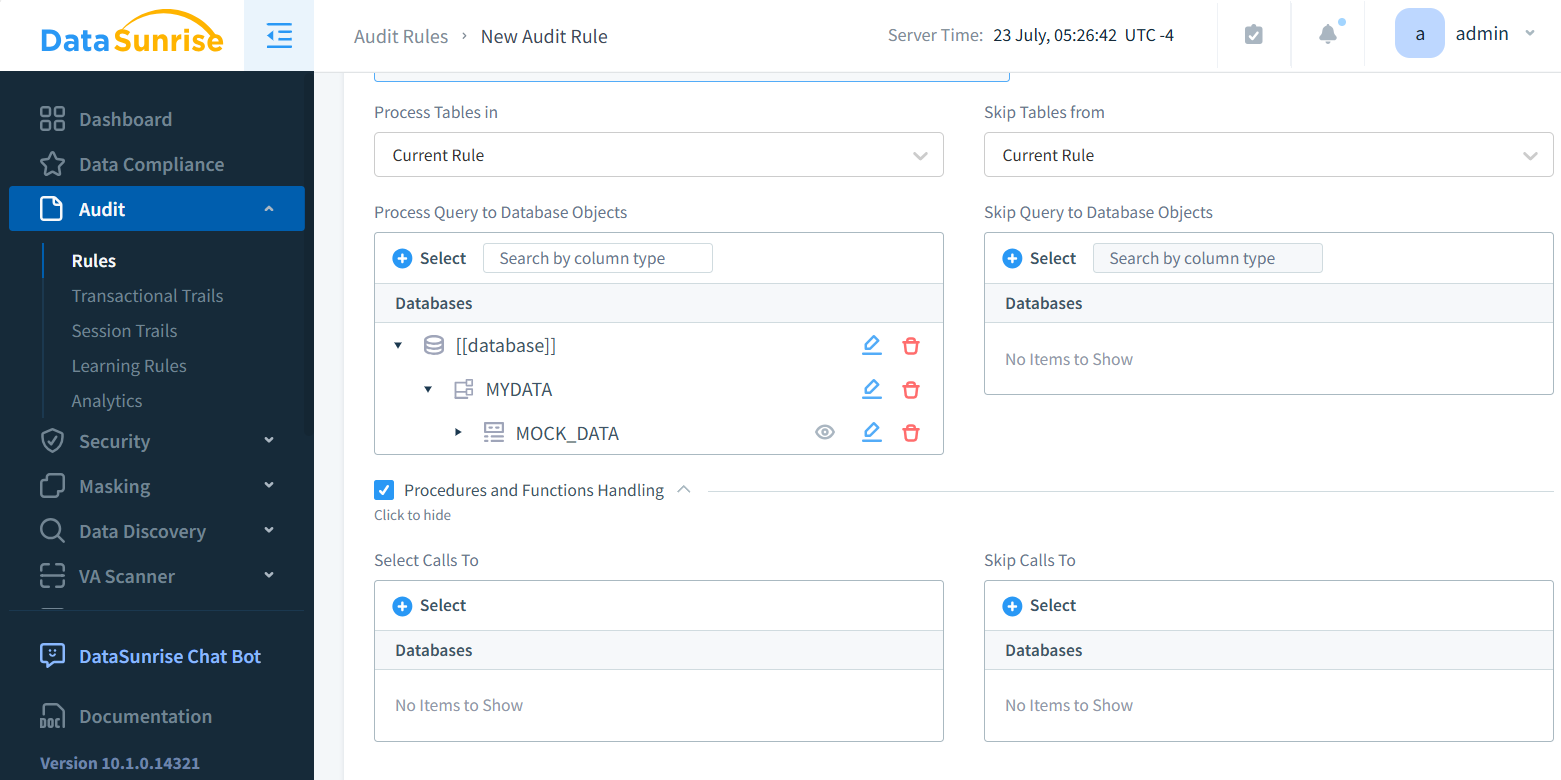
Test and Activate the Rule
We will use Python (below) to ensure the rule works as expected.
Auditing Queries from Python
Python’s versatility makes it an excellent choice for testing database queries. Let’s explore how to use Python to test simple SELECT queries against your audited Aurora database.
import pymysql
import time
# Database connection details
DB_CONFIG = {
'host': 'your-aurora-endpoint',
'port': 3308,
'user': 'your-username',
'password': 'your-password',
'database': 'MyData'
}
def execute_query(connection, query):
with connection.cursor() as cursor:
cursor.execute(query)
return cursor.fetchall()
def main():
try:
connection = pymysql.connect(**DB_CONFIG)
print("Connected to the MyData database successfully.")
for i in range(10): # Perform 10 SELECT operations
print(f"\nPerforming SELECT operation #{i+1}:")
select_query = "SELECT * FROM MOCK_DATA ORDER BY RAND() LIMIT 1"
results = execute_query(connection, select_query)
if results:
print("Random record:", results[0])
else:
print("No data found in the table.")
time.sleep(1) # Wait for 1 second between queries
except pymysql.MySQLError as e:
print(f"Error connecting to the database: {e}")
finally:
if connection:
connection.close()
print("\nDatabase connection closed.")
if __name__ == "__main__":
main()This code results in the following output:

Analyzing Audit Logs
After running these queries, check your DataSunrise audit logs. You should see entries for each operation, including details like timestamp, user, and query content.
The figure below showcases the Transactional Trails, providing an interactive view where each event is clickable for more detailed information.
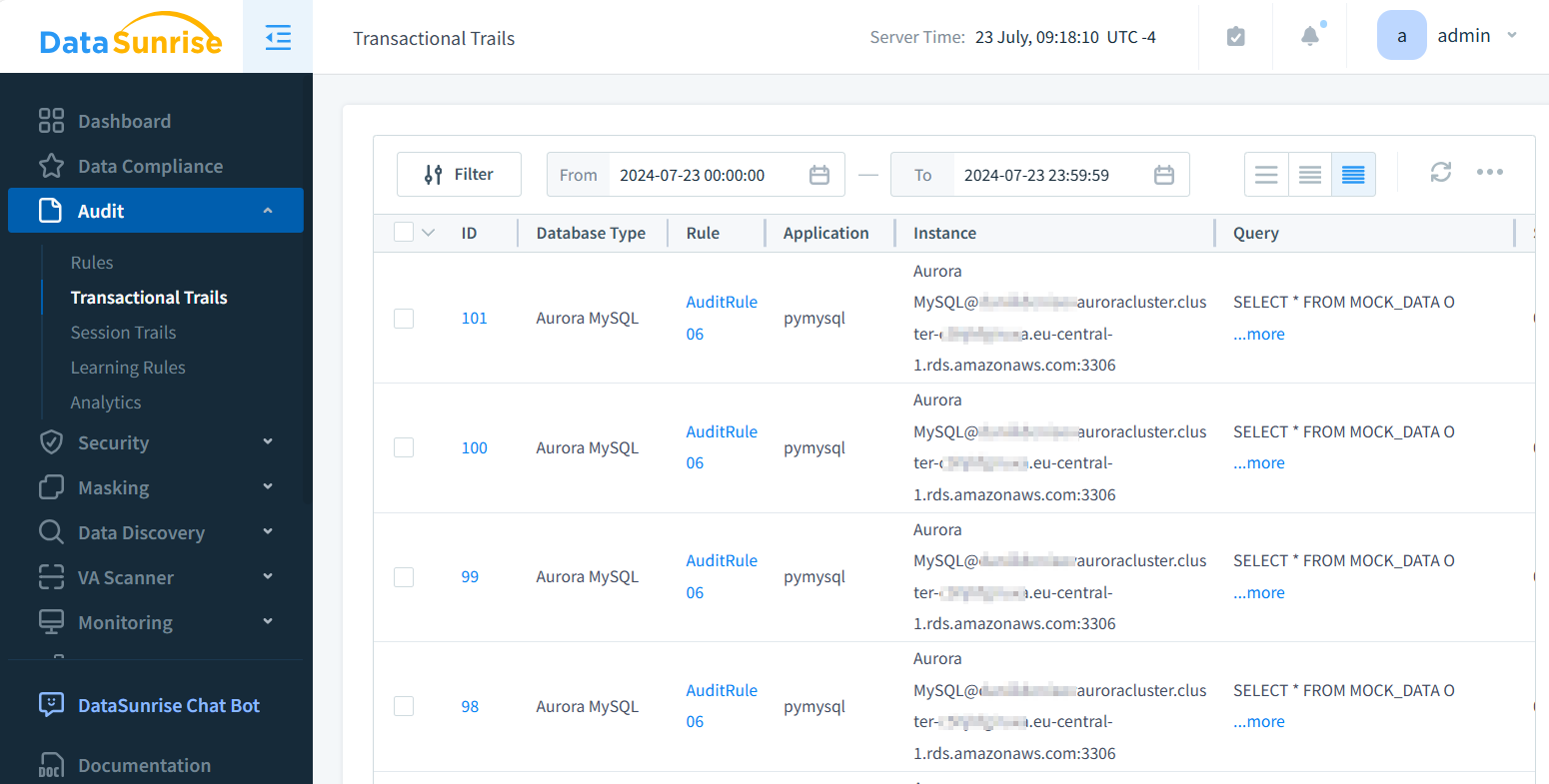
Note the Application is pymysql Python library. Clicking an event reveals comprehensive transaction details. Query results can be captured, but be cautious—this may quickly deplete storage on the DataSunrise Server system.
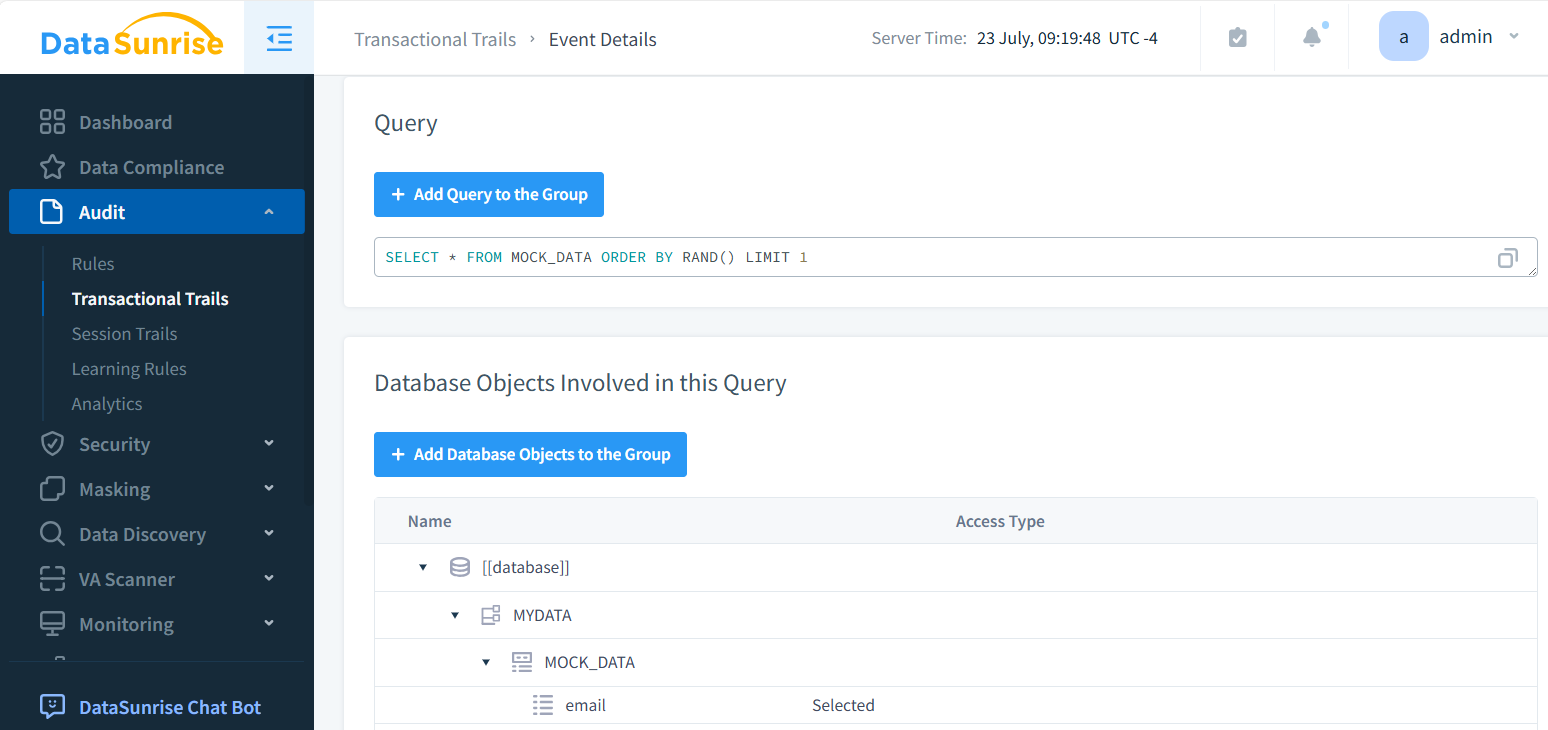
DataSunrise’s built-in monitoring tools enable precise assessment of server performance. The figure below displays key Antlr parameters:
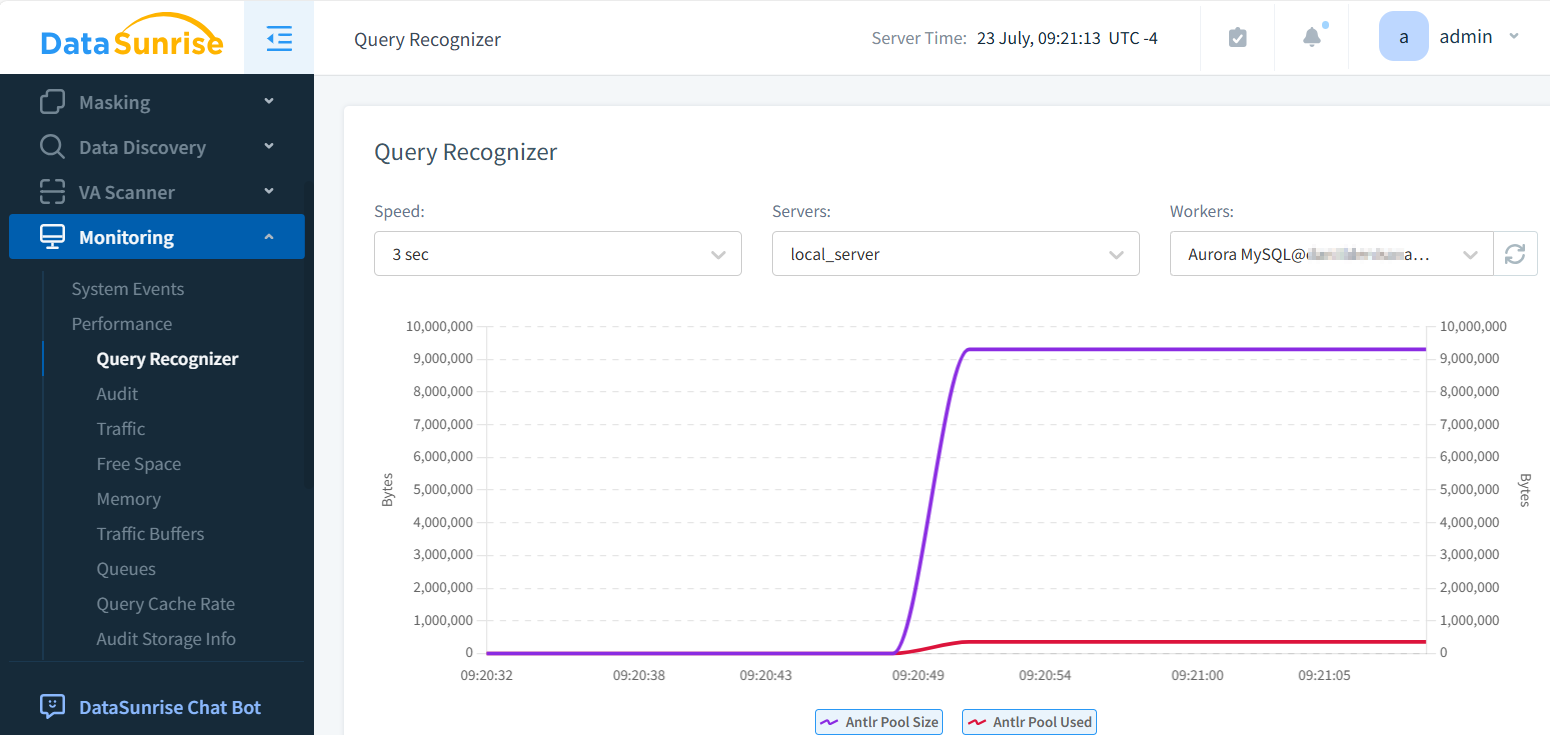
Best Practices for Data Auditing
Automation
Use automated tools to analyze logs and alert you to suspicious activities. This saves time and improves response times.
Least Privilege Principle
Implement the principle of least privilege. Users should only have access to the data they need for their roles.
Data Classification
Classify your data based on sensitivity. Apply stricter auditing rules to more sensitive information.
Challenges in Data Auditing
Performance Impact
Extensive auditing can impact database performance. Strike a balance between security and efficiency. Select proper DataSunrise operation mode.
Data Volume
As your database grows, so does the volume of audit logs. Implement efficient storage and analysis strategies.
Summary and Conclusion
Data auditing for Amazon Aurora is a critical component of database security and compliance. By leveraging third-party solutions like DataSunrise, you can implement robust auditing processes that go beyond native capabilities. Remember these key points:
- Third-party solutions offer enhanced features, compliance support, and user-friendly interfaces.
- Setting up DataSunrise involves deploying an instance and configuring audit rules.
- Python is a powerful tool for testing database queries and validating audit processes.
- Regular review, automation, and adherence to best practices are crucial for effective auditing.
DataSunrise offers user-friendly and flexible tools for database security, including audit, masking, and data generation features. Our solutions are designed to meet the complex security needs of modern enterprises. For a firsthand experience of how DataSunrise can enhance your database security, we invite you to visit our website and try our online demo today.
